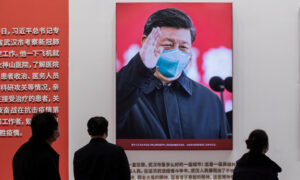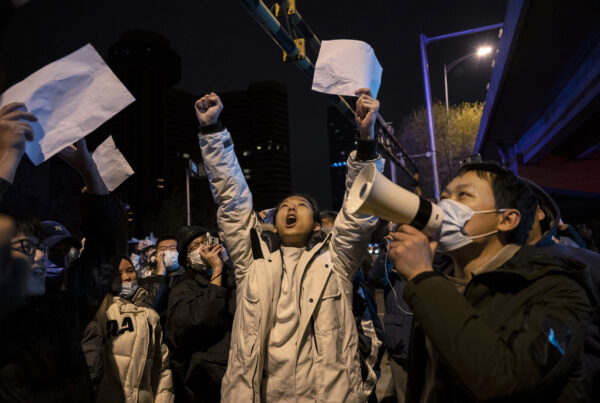Changing China’s COVID Policy Could Unleash Further Protests and Challenges for the CCP
CommentaryMuch has been made about the recent protests that rocked several major (and some minor) cities across China; protests mainly focused on the Chinese regime’s insistence on sticking to its outdated zero-COVID policy. Frustrations are running high, and Beijing’s abrupt shift toward loosening restrictions could spell further troubles on multiple fronts. There are likely many potential dilemmas occupying Xi Jinping’s mind right now, not only because he has painted himself, for years, as the one man ultimately responsible for the zero-COVID policy. Should the policy fail, it will be an uphill battle for him to shift the blame to others. He sought to reap all the rewards and may potentially have to reap its costs, too. Even though the Chinese Communist Party (CCP) has been avoiding answering if the shift in policy is in response to the protests, it can’t elude anyone that it is indeed. Beijing’s hesitancy to use force against the unparalleled protests (since 1989) indicates that the CCP quickly realized that the anger built up for so long could risk exploding if a heavy-handed response was used. It smartly chose to use a softer approach and announced several types of de-escalation of the zero-COVID policy in a move clearly aimed at appeasing the growing protests. However, the quick turnaround could, and should, also make it clear to the people affected, the Chinese people, that protests and demands for having a role in government policy can and do work. Will this lesson be quickly forgotten or remain with people even after zero-COVID ends? Will it be remembered when China starts seeing the real consequences of a slowing economy and government ineptitude in making adjustments to combat the slowdown? The short-term gain for the regime might have laid the foundation for a more long-term loss, depending on how successful Beijing is in its propaganda drive about why the CCP is changing its approach and policy. And whether people inside China learn, as we have outside of China, that the softer approach in response to the protests was skin-deep only, and that since there has been a significant roundup and detention of a large number of people deemed to have been key to starting the protests. Protesters shout slogans during a protest against the Chinese Communist Party’s strict zero-COVID measures in Beijing, China, on Nov. 28, 2022. (Kevin Frayer/Getty Images) Regardless, the reduction in controls presents more problems yet. Already the omicron variant of the virus is spreading faster than most seem to have expected, and mass outbreaks seem unavoidable. And here, Xi faces another problem, namely that a great portion of the most affected population, the elderly, are still not vaccinated or only partially vaccinated, and unlike in most countries, there has been no major rollout of booster shots. At this point, earlier vaccinations are unlikely to offer much protection. If mass outbreaks occur, not only will a lot of people get sick, but many people will die. And many of those deaths are in Xi’s hands. Why? While developed quickly and initially rolled out very effectively, Chinese vaccines are not very good. Having spent years painting the West as a disaster zone while China, under Xi’s personal steerage, as a safe haven of good governance, the CCP will find it hard to do what is needed: to import more effective vaccines developed and produced in and by the United States and European countries. And here comes the real crux: Will it become widely known in China that Western vaccines are far more effective and available to China? If it does, and Xi is seen as having refused to import and distribute such vaccines, will he be held accountable? It’s not a stretch to say it’s relatively easy to see that Xi’s refusal to import Western vaccines is because it could dent his personal standing and, therefore, power and that any such decision would put the lives of hundreds of thousands of Chinese, many of them parents or grandparents, at risk. Of course, the Chinese propaganda and censorship apparatus are working in overdrive. Perhaps they will be able to “guide” public opinion into thinking this change wasn’t brought forth by people’s protests—but it will be hard. Likewise, perhaps they can continue to keep up the charade that China’s vaccines are just as good. Maybe they can even hide the fact that Xi seems more than willing to sacrifice the lives of his own people just to make sure his hold on power isn’t dented. After all, even if he were to publically call for the import of better vaccines, it wouldn’t hurt him enough to challenge his power, not even close—it would merely move him down a peg or two, but apparently, even that is something that this dictator-for-life is unwilling to allow. At no point has the CCP been so dependent on its censors and propaganda machinery as in the months and maybe a year to come. Views expressed in this article are the opinions of the author and do not necessarily reflect the

Commentary
Much has been made about the recent protests that rocked several major (and some minor) cities across China; protests mainly focused on the Chinese regime’s insistence on sticking to its outdated zero-COVID policy. Frustrations are running high, and Beijing’s abrupt shift toward loosening restrictions could spell further troubles on multiple fronts.
There are likely many potential dilemmas occupying Xi Jinping’s mind right now, not only because he has painted himself, for years, as the one man ultimately responsible for the zero-COVID policy. Should the policy fail, it will be an uphill battle for him to shift the blame to others. He sought to reap all the rewards and may potentially have to reap its costs, too.
Even though the Chinese Communist Party (CCP) has been avoiding answering if the shift in policy is in response to the protests, it can’t elude anyone that it is indeed. Beijing’s hesitancy to use force against the unparalleled protests (since 1989) indicates that the CCP quickly realized that the anger built up for so long could risk exploding if a heavy-handed response was used. It smartly chose to use a softer approach and announced several types of de-escalation of the zero-COVID policy in a move clearly aimed at appeasing the growing protests.
However, the quick turnaround could, and should, also make it clear to the people affected, the Chinese people, that protests and demands for having a role in government policy can and do work. Will this lesson be quickly forgotten or remain with people even after zero-COVID ends? Will it be remembered when China starts seeing the real consequences of a slowing economy and government ineptitude in making adjustments to combat the slowdown?
The short-term gain for the regime might have laid the foundation for a more long-term loss, depending on how successful Beijing is in its propaganda drive about why the CCP is changing its approach and policy. And whether people inside China learn, as we have outside of China, that the softer approach in response to the protests was skin-deep only, and that since there has been a significant roundup and detention of a large number of people deemed to have been key to starting the protests.

Regardless, the reduction in controls presents more problems yet. Already the omicron variant of the virus is spreading faster than most seem to have expected, and mass outbreaks seem unavoidable. And here, Xi faces another problem, namely that a great portion of the most affected population, the elderly, are still not vaccinated or only partially vaccinated, and unlike in most countries, there has been no major rollout of booster shots. At this point, earlier vaccinations are unlikely to offer much protection. If mass outbreaks occur, not only will a lot of people get sick, but many people will die. And many of those deaths are in Xi’s hands.
Why?
While developed quickly and initially rolled out very effectively, Chinese vaccines are not very good. Having spent years painting the West as a disaster zone while China, under Xi’s personal steerage, as a safe haven of good governance, the CCP will find it hard to do what is needed: to import more effective vaccines developed and produced in and by the United States and European countries.
And here comes the real crux: Will it become widely known in China that Western vaccines are far more effective and available to China? If it does, and Xi is seen as having refused to import and distribute such vaccines, will he be held accountable? It’s not a stretch to say it’s relatively easy to see that Xi’s refusal to import Western vaccines is because it could dent his personal standing and, therefore, power and that any such decision would put the lives of hundreds of thousands of Chinese, many of them parents or grandparents, at risk.
Of course, the Chinese propaganda and censorship apparatus are working in overdrive. Perhaps they will be able to “guide” public opinion into thinking this change wasn’t brought forth by people’s protests—but it will be hard. Likewise, perhaps they can continue to keep up the charade that China’s vaccines are just as good. Maybe they can even hide the fact that Xi seems more than willing to sacrifice the lives of his own people just to make sure his hold on power isn’t dented. After all, even if he were to publically call for the import of better vaccines, it wouldn’t hurt him enough to challenge his power, not even close—it would merely move him down a peg or two, but apparently, even that is something that this dictator-for-life is unwilling to allow.
At no point has the CCP been so dependent on its censors and propaganda machinery as in the months and maybe a year to come.
Views expressed in this article are the opinions of the author and do not necessarily reflect the views of The Epoch Times.












